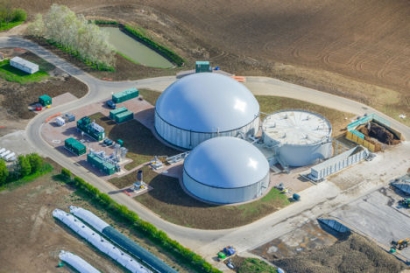
Thanks to years of maximizing the outputs of Future Biogas' 13 AD plants, this team of biologists has unparalleled specialist expertise. With the launch of Fern AD, they will be able to show other plant owners and managers how to use the latest science to optimize biogas yields. This will primarily be through the analysis of tank digester samples and subsequent provision of detailed, tailored guidance on how to improve
gas production.
As well as being the source of the latest scientific expertise on AD efficiency, Fern AD will be the exclusive retailer of its own tank digester additive, made with a balanced recipe of trace elements. The result of years of laboratory work and extensive practical trials, 'T16'
has been proven to support AD plant optimzsation.
Fern AD will also offer in-depth training on managing the microbiological aspects of AD plant operation. Wider consultancy on all other aspects of the AD process - plant operations, engineering, feedstock planning and silage clamping - will be available, when required.
In conjunction with its sister brand Fern Farming - which will launch the same day and be targeted at the agricultural sector - Fern AD will be the sole UK distributor of German brand BÖCK's world-renowned range of silage clamp sheeting, which has been shown in tests to create an oxygen-barrier considerably better than the industry standard. Fern AD and Fern Farming are the two halves of Fern - Future Biogas' new AD and farming offshoot.
Philipp Lukas, founder and managing director of Future Biogas, said, "Over the years, we've accrued a wealth of specialist knowledge, especially in our biology and farming teams. When it comes to the growing and ensiling of energy crops or the biological management of an AD digester tank, they truly are the experts.”
Dr. Denise Cysneiros, the microbiologist who heads up the Future Biogas and Fern AD lab, added, "There's no substitute for practical experience. My team and I manage multiple AD sites, day in, day out. As a result, we have an in-depth understanding of how they work. In some cases, we have turned around unprofitable plants, by pinpointing and addressing specific problems - thanks to our rigorous testing systems and specialist lab result interpretation.
"Our secret weapon is our in-house tank additive, T16. Energy crops, like maize and barley, seldom have the right balance of nutrients for the optimization of the AD process. Consequently, soon after joining Future Biogas, I set about creating a supplement for feedstocks. After extensive lab work and practical trials, the outcome was T16 - a unique
recipe of 16 trace elements, including carbon monoxide, selenium, manganese and nickel. It's been shown to boost biogas outputs, time and time again.”
In the AD process microorganisms are put in tanks. Harvested crops - like maize, sugar beet and whole crop rye - are then added. As the microorganisms break these feedstocks down, they release gas, which is siphoned off. It can then be supplied directly to the national grid,
after upgrade, as green gas or burnt to produce electricity. The leftover organic waste from this process is called digestate. It is dried, separated and used as natural fertilizer to help grow more crops.

